Showing 349–360 of 383 results
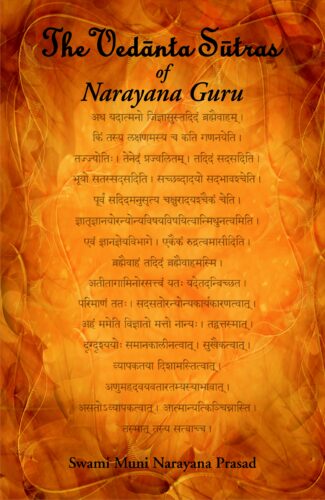
The Vedanta Sutras of philosopher-poet Narayana Guru has 24 beautifully-fluent sutras revealing the essential message of the Vedanta. The highly-perceptive commentary by Swami Narayana Prasad elucidates the gurus interpretation of the Vedantic concept.
Indias wisdom, one may say, attained its maturity in the Vedanta the end or culmination of veda (knowledge). Vedanta may be seen as the finest fruit on the tree of Indias wisdom, for it brings the seeker that ultimate knowledge that ushers in the gift of self-fulfilment (ananda). Over the centuries, brilliant saint-scholars like Shankara, Ramanuja, Madhva have interpreted the Vedanta in different ways. The philosopher-poet Narayana Guru belongs to this class of noted exponents of the Vedanta. And his Vedanta Sutras is a masterpiece in his attempt to restate the original Upanishadic teaching of non-dual Reality his most succinct expression of that message. This book presents these sutras along with a highly-perceptive commentary that elucidates the Gurus interpretation of the Vedantic concept in a brilliant style. Narayana Gurus Vedanta Sutras reveal the essential message of the Vedanta in 24 beautifully-fluent sutras. His simple and direct revaluation and restatement of the Vedanta, in general, has been found to be comprehensive and contemplative in its insight, reconciling the superficial disagreements of the Vedantic schools and restoring the pristine vision of the Upanishadic sages. In this scientific age, his work has often been acclaimed for its relevance. His Vedanta Sutras, compact yet profound in manner, is yet another example of this. The thoroughly-engrossing commentary of Swami Muni Narayana Prasad is a unique effort. Its hallmark is his clear avoidance of exegesis with greater reliance on his personal conviction. Swami Muni Narayana Prasad places Narayana Guru on par with the sutrakaras like Badarayana, Jaimini, Gautama and Kanada with this beautiful elucidation.
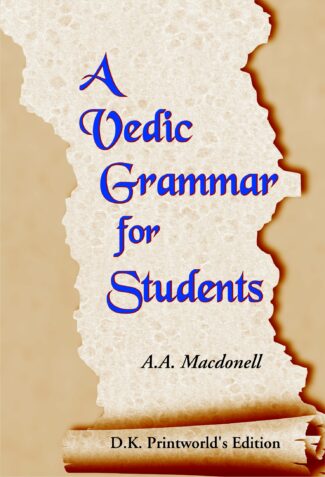
This book, typed afresh, presents a phonetic survey of Vedic sounds, offering explanatory accounts of Vedic sandhi-system, declension, conjugation, indeclinable words, nominal stem formation and syntax. It is the first ever most authentic, linguistic material of the Rgveda.
Here is a key to unlock the oldest treasury of mankinds wisdom: Vedic literature not just the metrical language of its hymns, but also the prose pieces of the Brahmanas/Brah-mana-like writings: whether from the Atharva or the Yujurveda. Setting forth a comprehensive phonetic survey of Vedic sounds, the author: an eminent Orientalist of yester years, offers lucid explanatory accounts of Vedic sandhi-system (euphonic combination), declension, conjugation, indeclinable words, nominal stem formation and, finally, of its syntax with numerous illustrations. At the base of Macdonells Grammar is the first ever, yet the most authentic, linguistic material of the Rigveda supplemented, though, it is from other Samhitas as well. Also marked here are the grammatical forms of the Brahmanas where they differ from those of the later-day classical Sanskrit. Now reprinted afresh in an innovative format, this book has sustained its decades-long worldwide importance as an undisputed, systematically organised aid to the study of Vedic literature. And, for sure, retains its indispensablity to scholars even today!

This book, typed afresh, presents a phonetic survey of Vedic sounds, offering explanatory accounts of Vedic sandhi-system, declension, conjugation, indeclinable words, nominal stem formation and syntax. It is the first ever most authentic, linguistic material of the Rgveda.
Here is a key to unlock the oldest treasury of mankinds wisdom: Vedic literature not just the metrical language of its hymns, but also the prose pieces of the Brahmanas/Brah-mana-like writings: whether from the Atharva or the Yujurveda. Setting forth a comprehensive phonetic survey of Vedic sounds, the author: an eminent Orientalist of yester years, offers lucid explanatory accounts of Vedic sandhi-system (euphonic combination), declension, conjugation, indeclinable words, nominal stem formation and, finally, of its syntax with numerous illustrations. At the base of Macdonells Grammar is the first ever, yet the most authentic, linguistic material of the Rigveda supplemented, though, it is from other Samhitas as well. Also marked here are the grammatical forms of the Brahmanas where they differ from those of the later-day classical Sanskrit. Now reprinted afresh in an innovative format, this book has sustained its decades-long worldwide importance as an undisputed, systematically organised aid to the study of Vedic literature. And, for sure, retains its indispensablity to scholars even today!

To resolve controversies related to Vedic Religion/Culture, the author comes to grips with the idea of Gods omnipresence in Aryan religious thought, the Rgvedic Hymn of Visvedevas, etc. and explores matters of historical and literary importance.
Despite two centuries of their multifarious, critical studies in India and the Western world, Vedic writings unveil myriad questions that have either baffled scholars or have led to serious controversies. A distinguished Indologist, Professor P.L. Bhargava marshals, for the first time, indisputable evidence to resolve some of these questions like, for instance: Who wrote the Rigvedic hymns? Which deities, in the Rigveda, constitute the group, called Adityas? Or, again in the Rigvedic contexts, what does the word asura mean? Who, of the two major Vedic gods: Indra and Varuna, has greater antiquity? Is Ayodhya: the birth place of Lord Rama, mentioned in the early Vedic literature? Where did Lord Ramas ancestors: the kings of Ikshvaku dynasty originally rule? And how far danastutis (the praises of gifts) of the Rigveda can help scholars to reconstruct the political history of the Vedic Age? Combining in him the erudition of a Sanskritist and a historian, the author also comes to grips with the idea of Gods omnipresence in Aryan religious thought, the enigmatic Hymn of Vishvedevas in the Rigveda, or the confounding words/phrases in its Hymn of Creation; besides several other issues of religious, cultural; historical and literary importance all these on the basis of his unbiased, life-long studies of the Vedic texts. An exquisite presentation of Dr Bhargavas writings, the volume covers a variety of themes that range from the very authorship of the Rigvedic hymns to the status of Vedic religion today. Invaluable to the scholars and specialists of Vedic lore.

This book deals with the various aspects of science and scientific thoughts of the Vedic bards reflected in their hymns. Attemps have been made here to analyse the Vedic verses in scientific terms adhering to various branches of modern science.
This book Vedic Science and Technology contains, in its ten chapters, the significant aspects of science and scientific thoughts of the Vedic bards reflected in their hymns and the modern scientific theories developed later. The Vedic deities symbolize the natural phenomena which the human beings of that period came across in their day-to-day life and had interactions with such events. Ostensibly, the modern scientific theories and practices have their roots in the most ancient tradition and culture. Various branches of knowledge such as Astronomy, Astrology, Cosmology, Cosmogony, Space-time Continuum, Mathematics, Chemistry, Physics, Meteorology, Seismology, Botany, Zoology, Medicine, Agriculture, Geology, Environmental Science and Ecology, and Science and Technology have been discussed here in accordance with speculations of the Vedic bards gleaned from the hymns. Earlier scholars belonging to other disciplines, especially from Linguistics, Mathematics, Physics and Astronomy have tried their best to interpret the Vedas from the point of view of their particular disciplines. But, here, in this study, attempts have been made to analyse the Vedic verses in scientific terms adhering to various branches of modern science. The present discourse, no doubt, forms a strong base for any microscopic investigations of the Vedic thought and notion to be taken up in future by our inspired scholars and scientists.

This book deals with the various aspects of science and scientific thoughts of the Vedic bards reflected in their hymns. Attemps have been made here to analyse the Vedic verses in scientific terms adhering to various branches of modern science.
This book Vedic Science and Technology contains, in its ten chapters, the significant aspects of science and scientific thoughts of the Vedic bards reflected in their hymns and the modern scientific theories developed later. The Vedic deities symbolize the natural phenomena which the human beings of that period came across in their day-to-day life and had interactions with such events. Ostensibly, the modern scientific theories and practices have their roots in the most ancient tradition and culture. Various branches of knowledge such as Astronomy, Astrology, Cosmology, Cosmogony, Space-time Continuum, Mathematics, Chemistry, Physics, Meteorology, Seismology, Botany, Zoology, Medicine, Agriculture, Geology, Environmental Science and Ecology, and Science and Technology have been discussed here in accordance with speculations of the Vedic bards gleaned from the hymns. Earlier scholars belonging to other disciplines, especially from Linguistics, Mathematics, Physics and Astronomy have tried their best to interpret the Vedas from the point of view of their particular disciplines. But, here, in this study, attempts have been made to analyse the Vedic verses in scientific terms adhering to various branches of modern science. The present discourse, no doubt, forms a strong base for any microscopic investigations of the Vedic thought and notion to be taken up in future by our inspired scholars and scientists.

Dr. Murthy marshals the whole extent of geological data from the Vedic/post-Vedic literatures and even later works like Varahamihiras Brhatsamhita to highlight the Vedic world-view of the earth, particularly the Vedic theory on Earth science.
Vedas are indisputably the oldest of mankinds documents. Which not just magnificently articulate the early civilized mans wonderment about the cosmos and his yearnings for the divine, but also unfold the foundations of many ancient sciences, like mathematics, astronomy, alchemy, metallurgy, botany and medicine. This book, however, is the first ever effort to show how Vedas embody the earliest discourses on the earth and the earth-related phenomena. Combining in him the acumen of a professional earthscientist and a highly proficient Sanskritist, Dr. Murthy marshals the whole extent of geological data from the Vedic/post-Vedic literatures, and even some of the later works, like Varahmihiras Brihatsamhita (of the 5th century ad) in his thematic effort to highlight the Vedic worldview of the earth and, importantly, how it almost approximates the projections of modern earthscience. Developed from over three decades of Dr. Murthys researches in ancient Sanskrit literature, the study employs contemporary scientific idiom to describe Vedic perception of the earth, its origin, shape, dimensions, constitution, movements, quakes/tremors, and its position vis-a-vis the solar system, stars and ethereal space. Also including, contextually, the Vedic idea of heliocentricity, the book puts forth the Veda-based methods for deciphering/predicting deep-focus earthquakes for future research and investigation. Together with a glossary of Sanskrit terms and relevant bibliographic references, this geological perspective on the Vedas will fascinate scholars, specialists and discerning readers alike.

The book gives account of the Vaishnavite temples of Kanci, providing numerous pictures with the structural, architectural and sculptural aspects of the temples. It also throws light on the historical, religious, social and cultural values of the temples.
Kancipuram was the important capital of north Tamil Nadu for a long period — from the first-second century ce to the end of the seventeenth century. It was a beautiful city laid out in the form of a lotus, according to the poem Perumbanarrupadai. It was admired by the world as a place famous for its festivals and noted for its temples. Through the ages, it has been the abode of many religious leaders who devoted their lives to the religious uplift of the people.
This well-illustrated work presents a history of the Vaishnavite temples of Kanci, focusing on the history of the ancient temples from the Sangam Age onwards, the many legends, myths and other accounts that refer to it, and its location and building. It provides a detailed account of some major temples of the city supported by numerous pictures of the temples that cover various aspects of each — the entrance and other parts of each temple structure, its architecture, and its artistic engravings particularly its sculptural beauty. It delves into the Vaishnava tradition for concepts and ideas underlying the construction of the sanctum and the sub-shrines, and portrayal of divine forms on the walls, pillars and other parts of the temple. There is a detailed study of the sculptures in the main walls of the temples and the main deities in the shrines. It also examines the many inscriptions found in the temples to offer insights into the historical, religious, social and cultural value of the temples.
The volume is bound to interest a host of readers, particularly scholars and students of Indology involved in the study of the cultural traditions of south India and its religious art and architecture.

A comprehensive and intelligent piece of literature, for all that you yenned to know about the King of Indian slide Guitar, creator of Mohan Veena and Vishwa Veena, Grammy Award winner and a true human being in absolute terms, Pandit Vishwa Mohan Bhatt, complete with his inspirations, aspirations, musings and goals.
Saga of a living phenomenons journey on mesmerisingly melodious musical notes. His fascinating imagination, strengthened by divine interaction, culminated in the innovation of the Mohan Veena and the Vishwa Veena. Embodiment of avant garde thought process, the legend crafted the instruments to express the subtle nuances and intricacies of Indian Classical raags, with perfection. His relentless efforts and soul stirring concerts seasoned by a fine balancing act between Indian Classical and other Global-regional musical styles, catapulted Indian Classical music, to a global stage. A chronicle of all those fusion concerts with compatriot musicians and several globally renowned virtuosos which surrepetitiously slip one into a state of trance, with their resonating acoustics. Recollections of that glorious yet humble soul who helped realize the Great Indian Musical Dream. Reflections on the performances and discography; aspirations and inspirations; musings and goals of a paradigm of musical genius. Here is a comprehensive piece of writing, for all that you yearned to know about the King of Indian slide Guitar, the creator of Mohan Veena and Vishwa Veena, a Grammy Award winner and a true human being in absolute terms Pandit Vishwa Mohan Bhatt.
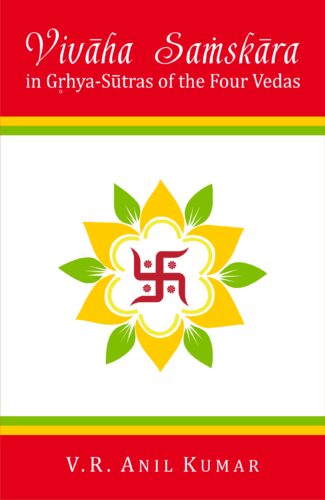
Of a rare kind, this book does comparative analyses after studying seventeen Grhya-Sutras across four Vedas of the number and type of rituals of marriage in each Grhya-Sutra and the order of performance of rituals. It also lists the mantras (with English translation) and their sources and talks about the differences in employing the mantras.
Vivaha (marriage), in Hindu society, is one of the most important samskaras, out of the sixteen sacraments, which a person steps in with full understanding/consciousness. Marriage is a fascinating experience that stays alive in ones mind throughout the life. The mantras and slokas of the Grhya-Sutras of the four Vedas, chanted in this ritual, are in Sanskrit and a vast majority is unaware of their meanings and just follows the instructions of the celebrant priest, purohita.
The author delves deep into the Grhya-Sutras of Vedas and brings forth the details of vivaha samskara principles, philosophy, practices, rituals and so on. Grhya-Sutras Asvalayana, Sankhayana and Kausitaki of Rigveda; Paraskara (Sukhla Yajurveda), Apastamba and Hiranyakesin (Krsna Yajurveda), Baudhayana, Varaha, Manava, Agnivesya, Bharadvaja, Kathaka and Vaikhanasa of Yajurveda; Gobhila, Khadira and Jaimini of Samaveda; and Kausika of Atharvaveda are well explored and seriously analysed, having given the original mantras in Sanskrit with their English translation.
Of a rare kind, this book does comparative analyses of the number and type of rituals in each Grhya-Sutra and the order of performance of rituals.
This scholarly work creates a sudden seriousness and sanctity to vivaha samskara through the detailing of mantras and the rituals. Being in it, one is not far off the Vedic period, giving a new meaning and dimension to our understanding of Hindu vivaha samskara and its sanctity.
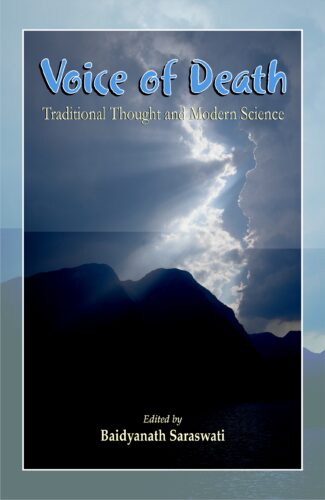
This book, presents an in-depth study of the concept of death from the distinct viewpoints of all religions and cultures and at the same time taking into account their common concept of continuity of life after death, in contrary to the biological science that adheres to the mechanism of cell-death.
If life is a reality, the death is an eternal truth. Does immortality mean clinging to body? If so, it cannot be the life artificially alive as in modern hospitals. Is extinction of species important? The recent developments in the field of molecular biology to clone the extinct animals may raise another dimension: do the species ever die? Death is not the extinction of life, it rather opens a horizon for new journey on this planet or the other. If a person elevates himself and immensely contributes to the society, he gets perpetuated and becomes immortal. Every culture has its own eschatology bearing with death, rituals, customs, beliefs and values. While the Hindus and the Buddhists adhere to the theory of reincarnation, the Muslims and the Christians hold the concept of eternal after life. In the present book, originally the proceedings of the seminar organized by the N.K. Bose Memorial Foundation, Varanasi, various distinguished scholars have richly contributed in presenting an in-depth study of the concept of death from the distinct viewpoint of all religions and cultures and at the same time taking into account their common concept of continuity of life after death in contrary to the biological science that adheres to the mechanism of cell-death. Through the social, philosophical, medical, and ayurvedic approaches to death, the existence of soul based on the ideas of immortality and ancestor-worship has been further validated. The book has demonstrated as to how this hard-headed research can illuminate a certain theory that would serve as a bridge between the physical science and social science, the purpose being to reveal the most overall general character of Nature and the nature of Man. This book would definitely appeal to all general readers and more particularly to those of philosophical temperament keen to know more about Death and also the world beyond it.
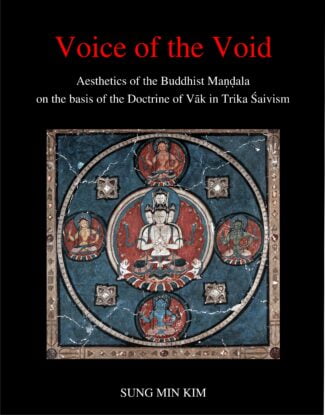
This volume examines how the perceptible form of Buddhist mandalas represents shunya (void), with special reference to the mandalas of Tabo and Alchi. On the basis of the concept of vak (subtle sound) in Trika Shaivism of Kashmir, it investigates where their aesthetic power derives from.
The research undertaken here about Buddhist mandalas is basically designed under the philosophical question how the visible dimensions of forms are related to their invisible contents. The textual sources in reference to Buddhist mandalas teach that the essence of mandalas is shunya (void) and their forms are the reflective images (pratibimba) of shunya. This volume investigates how the colourful form of Buddhist mandalas represents the prime concept of shunya, and what makes these mandalas visually powerful, leaving the impression of ßspiritual enhancementû in the heart of people who do not even know about the Buddhist doctrines.
The mandalas permanently represented in the monastic complexes of Tabo and Alchi in the Western Himalayas have been focused in order to examine a prominent role of visual dimensions of mandalas. In order to comprehend mandalas in the context of Buddhist philosophy, the texts of the Yoga-Tantra class have been looked up. Especially, the references to the tantric visualization-practice throw light on the internal experiences with mandalas.
Considering the fact that the Buddhist mandalas have been developed as a method of Mantrayana, being always combined with mantras and mudras, this volume presents the concept of vak (word, subtle sound, voice) as a key to explain how the ultimate state of shunya and perceptible forms of mandalas are related to each other. The doctrine of vak developed in the tradition of Trika Shaivism in Kashmir provides us with a systematic way to explain the non-dualism between all phenomenal objects and the Supreme Divine. The doctrine of four levels of vak is examined in the book for the purpose of interpreting the aesthetic phenomena and structuring the different levels of meanings of mandalas from the aesthetic perspective. On the basis of the vak theory, the external forms of mandalas have been explored and their visual principles have been technically analysed, in attempt to answer the question: how do the colourful forms of Buddhist mandalas resemble the formless shunya?
| × |
|
Lilavati Vithi of Ramapanivada 1 x ₹585.00 |
| × |
|
Agneya-Kona of Bharatavarsha 1 x ₹990.00 |
| × |
|
Art & Archaeology of India 1 x ₹630.00 |